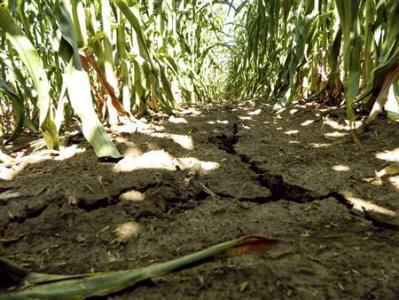Midwest crops, fish, water supply punished by drought
Date: 30-Jul-12
Country: USA
Author: Sam Nelson and Karl Plume

A drought-damaged corn field is pictured near Emery, Iowa July 27,
2012.
Photo: Karl Plume
Temperatures heading north of 100 degrees Fahrenheit and scarce rain portended another blistering weekend for much of the U.S. Midwest, where the most extensive drought since 1956 is devastating crops, evaporating rivers, and threatening to push world food prices higher.
Violent storms brought rain to the extreme eastern portions of the corn belt in Ohio on Thursday night, but moisture was sparse further west.
The mercury soared in Missouri, where St. Louis was expected to reach 101 degrees F (38 Celsius) on Friday. Drought is afflicting nearly all of east-central Missouri, central and western Illinois and much of Iowa, all major corn and soybean producing states.
Farther west in Kansas City, temperatures were expected to move back over 100 degrees on Sunday as residents looked for ways to conserve water.
In Missouri, more than 600 farmers have applied for state funds to drill new wells, deepen existing wells or expand irrigation systems under a program for livestock and crop farmers severely hit by drought, Governor Jay Nixon said.
In Kansas, Governor Sam Brownback objected to federal officials releasing water from three Kansas reservoirs to keep the Missouri River navigable and protect endangered birds. A spokesperson said Brownback preferred to keep the reservoirs as high as possible to conserve water for farmers and communities drawing from them.
A year ago, the Missouri River flooded parts of Iowa, Nebraska, Kansas and Missouri, tearing up levees and roads and inundating fields.
After flooding last year, the Mississippi River is now so low that barge operators must lighten loads to avoid getting stuck.
FISH DYING, FOWL MAY BE NEXT
Extreme conditions are killing fish by the thousands in lakes and rivers and could pose a problem for migrating ducks and other waterfowl if the drought stretches into the fall, officials said.
Nationwide, fishing losses could run from tens of millions to hundreds of millions of dollars depending on how long the drought lasts and how widespread it is, said Dan Stephenson, an Illinois state fisheries biologist.
Damage to corn, soybean and wheat crops is expected to push food prices higher in the United States and around the world. The United States is the world's largest exporter of corn, soybeans and wheat.
At the Chicago Board of Trade on Friday, corn for September delivery was up 2.2 percent, August soybeans up 1.7 percent and September wheat up about 1.6 percent.
Over the next week, soaring temperatures and little rain were in store for crops in most of Illinois, Iowa, Nebraska, Kansas and Missouri, said Don Keeney, an MDA EarthSat Weather meteorologist.
"Crops will continue to deteriorate. The corn crop is already gone. and in the north and east, beans will improve some but not in the southwest," Keeney said.
Showers and cooler temperatures were expected to bring some relief to eastern parts of the Midwest on Friday, and on Saturday and Sunday in the northwest part of the region, Keeney said.
Farmers planted corn and soybeans earlier than usual this year after a warmer than normal winter, but conditions have rapidly deteriorated.
Trade sources said on Friday that Informa Economics had cut its estimate for 2012 U.S. corn yields per acre and production and its projection for U.S. soybean yields per acre and overall production.
Corn yield prospects in central and northeast Iowa were highly variable, scouts on a U.S. Midwest crop tour said.
Some plants have withered and died in the worst drought in 56 years, some have thin stalks and small ears, and others are mostly green, but visibly stressed.
All of Iowa was in severe drought or worse, according to the weekly U.S. Drought Monitor for the week ending July 24 issued by climatologists, and almost 30 percent of the nine-state Midwest was suffering extreme drought.
(Additional reporting by Alyce Hinton in Chicago, Kevin Murphy in Kansas City and Brendan O'Brien in Milwaukee; Writing by David Bailey; Editing by Mary Milliken, Toni Reinhold)
![]()
© Thomson Reuters 2012 All rights reserved